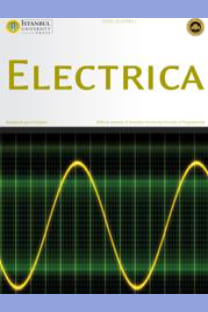" Effect of Improving Perturb and Observe MPPT Algoritm on AC Grid Connected PV Systems
" Effect of Improving Perturb and Observe MPPT Algoritm on AC Grid Connected PV Systems
DC-AC power converters, maximum power point tracking, P&O algorithm solar power generation,
___
- Alcaraz G.G., Galvan E.i Gonzalez N., Javadi M.S., " Renewable energy resources short-term scheduling and dynamic network reconfiguration for sustainable energy consumption", Renewable and Sustainable Energy Reviews, vol. 52, no. 2015, pp. 256-264. August, 2015.
- Thayalan D.T., Lee H., Park J.H., "Low-Cost HighEfficiency Discrete Current Sensing Method Using Bypass Switch for PV Systems", IEEE Transactions on Instrumentation and Measurement, vol.63, no.4, pp. 769-780, April, 2014.
- Koutroulis E., Blaabjerg F., " A New Technique for Tracking the Global Maximum Power Point of PV Arrays Operating Under Partial-Shading Conditions", IEEE Journal of Photovoltaics,vol.2,no. 2, pp. 184-190. April, 2012.
- Subudhi B., Pradhan R., " A Comparative Study on Maximum Power PointbTracking Techniques for Photovoltaic Power Systems", IEEE, Transactions on Sustainable Energy, vol. 4, no. 1, pp. 89-98. January, 2013.
- Nabulsi A., Dhaouadi R., " Efficiency Optimization of a DSP-Based Standalone PV System Using Fuzzy Logic and Dual-MPPT Control", IEEE Transactions on Industrial Informatics, vol. 8, no. 3, pp. 573-584. August, 2012.
- Esram T., Chapman PL., "Comparison of photovoltaic array maximum power point tracking techniques", IEEE Transactions on Energy Conversion, vol. 22, no. 2, pp. 439449, June, 2007.
- Özçelik M.A., Yılmaz A.S., "Improving the performance of MPPT in PV systems by modified Perturb-and-Observe algorithm"(DC side), Journal of Engineering Research, vol.3, no.5, pp.-77-96, September, 2015.
- Guerra A.,Zhang J., "GaN Power Devices for Micro inverters", Power Electronics Europe, Issue 4, page 28-31, June, 2010.
- Barchowsky a., Jeffrey P.P., Grogery F. Reed, Mathew J. Korytowski, Brandon M. Grainger. "A comparative study of mppt methods for distributed photovoltaic generation", IEEE Innovative Smart Grid Technology, Washinton, USA, page 17, 16-20 January, 2012.
- Pandey A, Dasgupta N, Mukerjee A.K, "A Simple-Sensor MPPT Solution", IEEE Transactions on Power Electronics, vol.22, no.2, pp. 698-700, March, 2007.
- Ding K, Bian X, Liu H, Peng T, "A Matlab-Simulink-Based PV module Model and Its Application Under Conditions of Non uniform Irradiance", IEEE Transactions on Energy Conversion, vol.27, no.4, pp. 864-872, 2012.
- Burger, B.; Kranzer, D.; "Extreme high efficiency PV power converters", Power Electronics and Applications. EPE’09.13 th European Conference, Freiburg, Germany, pp. 1-13, 8-10 September, 2009.
- Zainuri M., Radzi M., Soh A.C., Rahim N.A., "Development of adaptive perturb and observe-fuzzy control maximum power point tracking for photovoltaic boost dc-dc converter", IET Renewable Power Generation, 8; 2; pp.183-194, March, 2014.
- Kashif I, Zainal S., " A Review of maximum power point tracking techniques of PV system for uniform insolation and partial shading condition". Renewable and Sustaniable Energy Review, vol.19, pp. 475-488, January, 2013.
- Weidong X, Dunford WG, Palmer RP,Capel A.," Application of centered differentiation and steepest descent to maximum power point tracking". IEEE Transactions on Industrial Electronics,vol. 54, no.5, pp. 2539-2549, October, 2007.
- Onat N., Recent Developments in Maxim. Power Point Tracking Technologies for Photovoltaic Systems. International Jour. of Photoenergy, vol. 2010, pp.1-14, article ID 245316,November, 2010.
- Kulkarni A., John V., "Mitigation of Lower Order Harmonics in a Grid-Connected Single-Phase PV Inverter", IEEE Transactions on Power Electronics, 28; 11; pp.5024-5037, November, 2013.
- ISSN: 2619-9831
- Yayın Aralığı: 3
- Başlangıç: 2001
- Yayıncı: İstanbul Üniversitesi-Cerrahpaşa
FRACTIONAL ORDER CONTROL OF A SINUSOIDAL OUTPUT INVERTER
DYNAMIC MASS MEASUREMENT AND APPROPRIATE FILTER ANALYSIS
Observer Design With Better Delay Margin for Linear Time-Delay Systems
Md. Aminul HAQ, İbrahim Beklan KUCUKDEMİRAL
SHORTEST PATH ALGORITHMS FOR PETRI NETS
Hourly Day Ahead Solar Irradiance Forecasting Model in LabVIEW Using Cloud Cover Data
Oğuzhan CEYLAN, Michael STARKE, Phil IRMİNGER, Ben OLLİS, Dan KİNG, Kevin TOMSOVİC
Murtaza FARSADİ, Tohid SATTARPUR, Amin YAZDANİNEJADİ
Loss Reduction Benefit and Voltage Profile Improvement by Considering Demand Response and Capacitor
Murtaza FARSADİ, Tohid SATTARPOUR DİZAJİ, Hadi HOSSEİNNEJAD
Tohid SATTARPOUR, Daryoush NAZARPOUR, Sajjad GOLSHANNAVAZ
Best Supported Emigrant Creation for Parallel Implementation of Artificial Bee Colony Algorithm
